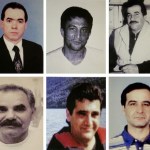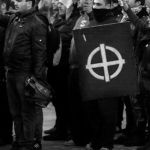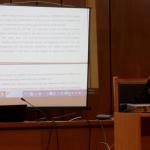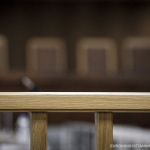43rd Hearing, Three-Member Criminal Appeals Court, Women’s Wing, Korydallos Prison, Athens, 11 January 2016
1. Court access
The proceedings remain open to the public on presentation of a state ID card, which is retained by police for the duration of the session. The courtroom had roughly the same number of spectators today as at the last hearing, but there were seats available until the session was adjourned. It should be noted that the seats reserved for accredited journalists were, again, almost completely filled.
2. Presence and representation of the defendants
When the session was called to order, eight defendants were present, 33 were recorded as absent and 28 were represented by counsel.
3. Resumed examination of witness Dimitris Bagios by civil action lawyers
Responding to questions by Angelos Vrettos, one of the civil action lawyers for the PAME trade unionists, witness, Dimitris Bagios, a police officer with Dias motorcycle squad, said he could identify some of the defendants. Specifically, he replied that he could identify Ilias Kasidiaris (a Golden Dawn MP). The witness said he had a visual image of the assault squads. When shown photographs by counsel, the witness said he recognised Kasidiaris among what, to the best of his knowledge, was as assault squad. The witness said that Kasidiaris’ role in the picture he was shown was to speak to the members and give them instructions. He could not recognise the place where the photos had been taken. In another picture he was shown by counsel, the witness said he recognised (Golden Dawn leader) Nikos Michaloliakos giving a Nazi salute. The witness said he was last to arrive at the site where Pavlos Fyssas was murdered as he had remained behind to give backup to a fellow officer who was carrying a submachine gun as there was the danger he could be attacked by the crowd to seize the weapon.
Questioned by Takis Sapountzakis, another of the civil action lawyers for PAME, the witness said there had been four or five people surrounding Fyssas and hitting him. They were similar in appearance to 15 or 20 people being chased by the witness and his fellow officers. The witness did not believe that the presence there of these four or five people was coincidental. The witness replied that the submachine gun carried by one of the police officers was insufficient against a crowd of some 50 helmeted, club-wielding individuals and that it was thus necessary for the entire Piraeus police force to rush to the scene. The witness, while stating he did not know the exact difference between a clash and an attack, nonetheless believes Fyssas was attacked.
Replying to questions by Manos Malagaris, another civil action lawyer for PAME, the witness said he had not heard anyone giving instructions or orders. The presiding judge, Maria Lepenioti, did not allow a question as to whether the witness thought the crowd’s organised flight from the scene suggested they were a controlled group or whether this was just a random dispersal. The rationale for disallowing the question was that a reply was subject to the witness’ personal judgment.
In response to questions from civil action lawyer Thodoris Theodoropoulos, also for PAME, the witness said there was no new evidence to date that would reverse his belief that the meeting on the fatal night was a meeting of Golden Dawn. The witness replied that he knew from media reports that Golden Dawn members had gathered at the Golden Dawn branch in Nikea after receiving a message to do so. He personally heard Giorgos Roupakias justify his action by claiming it had been preceded by an attack perpetrated by Fyssas on “some of his [Roupakias’] guys”. Nonetheless, the witness denied hearing Roupakias say, “I’m one of you, don’t tell anyone [about this]” or that his fellow officers had mentioned something to that effect. The witness stated that he had no doubts that Roupakias was the perpetrator in Fyssas’ murder. The witness did not know if Roupakias had been placed in isolation after being taken to Keratsini police station or if his mobile phone had been seized, thus depriving him of the ability to communicate. The presiding judge did not allow the lawyer’s question as to whether suspects in serious crimes are allowed to keep their phones and communicate with other suspects. Finally, the witness said that as a police officer, he had not received training in shooting while moving against a river current or in navigation with or without compass or outdoor survival and scouting; he said he had only received such training as a soldier and that this type of activity was not suited to civil or labour groups.
4. Cross-examination of witness Dimitris Bagios by defence lawyers
Answering questions from defence lawyer Nikos Kontovazenitis, the witness said the dispatch call his team had received mentioned clubs but that he did not see any himself when they arrived at the scene. But he made it clear that the fact he did not see a club didn’t mean there weren’t any there. The witness claimed that he did not see someone actively involved in Fyssas’ murder among the 15 people who fled towards Tsaldari street. In response to a related question by counsel, the witness replied that an individual with a helmet could be considered as armed since he could inflict damage with the helmet.
During questioning by defence lawyer Dimitra Velentza, the witness replied that some of the crowd were being verbally abusive. The lawyer noted that he had not mentioned this in his deposition to Piraeus investigating magistrate Stefania Hanioti. The witness clarified that the invective had come from those fleeing, not the 50-odd individuals gathered there. The presiding judge reminded the defence lawyer that this had been the witness’ precise testimony to the Piraeus investigating magistrate. The witness stated that he hadn’t heard anyone asking for help from Angeliki Legatou, a member of the Dias police motorcycle unit. He assured that no one attacked them that night or obstructed them. He mentioned that he had himself heard Roupakias excuse his action by saying “he hit some of my guys”. Bagios stated that he sought witnesses in the area but everyone claimed to have just arrived at the scene and not seen anything. He had not been approached by the two young women – Dimitra Zorzou and Paraskevi Karagiannidou – to provide identification data as eyewitnesses. The witness said it was possible that someone may have helped the paramedics lift the stretcher into the ambulance as Fyssas was heavy.
Questioned by defence lawyer Vasilis Oplantzakis, the witness replied that his team did not see any altercations when they arrived outside the Koralli café, but that he had mentioned that specific location as the scene of the incident because that is what had been conveyed by the dispatcher. The witness said he was absolutely certain that the 40 or 50 individuals there were those mentioned by the dispatcher and were members of Golden Dawn, something he inferred from their appearance based on what he had seen in the media. In response to the defence attorney’s questioning, the witness said that even though he and his fellow officers had not been giving chase to 15 people, they would not have reached the scene of Fyssas’ murder and would not have arrested Roupakias. The witness said that looking at the broader picture of the incident, he would describe it as an assault. The witness identified Fyssas’ attackers as members of Golden Dawn based on their appearance. The witness mentioned that when they reached the scene, Fyssas was initially standing and enraged, and that they had asked him to calm down and sit. He mentioned that no one except Roupakias had got out of the car and that no one tried to distract Roupakias. The witness recalled Dimitris Hatzistamatis (the alleged intermediary) as being especially tense at the scene.
At this point a recess was called because of tension in the adjacent corridor between Magda Fyssa, mother of Pavlos Fyssas, and Giorgos Patelis, leader of the Golden Dawn branch in Nikea.
When the hearing resumed, in response to questions by defence lawyer Christoforos Tsagkas, the witness said no one prevented them [police] from discharging their duties that night. The witness said his knowledge of the assault squads was from media reports.
In response to questions by defence attorney Giorgos Roumpekas, the witness said he had been frightened by the crowd’s size. He also mentioned that what he had also learned from fellow officers was that Fyssas had been attacked by five people.
The witness was questioned next by defence attorney Dimitris Gavelas and said that the call his team had received from the main dispatcher had said some 40 or 50 people wielding clubs were headed towards Koralli café. The witness replied that he himself had not seen any members of the crowd carrying a club. Asked by the defence lawyer why he mentioned the clubs as he had not seen any himself, the witness said he hadn’t heard the dispatcher’s call himself but that it had been conveyed to him by his fellow officers exactly as he described. The witness did not know why the word “clubs” was not included in his deposition to the Piraeus investigating magistrate, attributing this to a possible error. The witness said he saw the four or five people who had surrounded Fyssas as they distanced themselves and that they had a similar appearance to the rest of those gathered there, and thus were not random passersby at the scene.
Questioned by defence attorney Dimitris Bonis, the witness said that when they arrived on the scene, neither he nor his fellow officers knew there had been an earlier incident at Koralli; they learned that from the media later.
In response to a follow-up question by Velentza, the witness said that when he reached the scene, Fyssas was in a furious state, hyperactive and was told [by police] to sit down.
Answering questions by defence lawyer Stathis Karydomatis, the witness said that during the time he was at the scene, he was not aware of anyone giving orders or directions, or that those at the site were in ranks, but their flight suggested they were organised.
Defence lawyer Periklis Stavrianakis asked the witness why he hadn’t mentioned the word “clubs” in his deposition to the Piraeus investigating magistrate but had in testimony before investigating magistrate Ioanna Klapa. However, the presiding judge disallowed the question as it had been asked earlier and answered by the witness. The defence lawyer commented that the witness’ testimony had evolved strangely.
5. Comments of the civil action lawyers on Dimitris Bagios’ court testimony
Commenting on the witness’ testimony, civil action lawyer Violetta Kougiatsou (for the Fyssas family) said it showed that a large number of people had gathered on a small street in a short period of time resulting in the fatal outcome.
Civil action lawyer Chrysa Papadopoulou mentioned that the fact that the witness had not heard any orders or directions being issued did not rule out the possibility of prior planning at the organisation’s local branch in Nikea. Who handcuffed Roupakias did not emerge from the witness’ testimony. She mentioned that the witness testified that no one had obstructed them [the police] from discharging their duties because, as she noted, they simply did not discharge them. Finally, she mentioned that it was significant that when questioned by the bench, the witness had broken down in manner that neither Pavlos’ mother nor the two student eyewitnesses had.
Civil action lawyer Eleftheria Tompatzoglou (also for the Fyssas family) emphasised it was worth noting that rather than resigning, the two officers had received commendations.
Her colleague, civil action lawyer Andreas Tzelis, noted that the officers’ lack of credibility suggested, on the one hand, their total lack of training and, on the other, a possible pre-arrangement with the assembled Golden Dawn members and emphasised that this was something the court had an obligation to investigate.
Takis Zotos, civil action lawyer for the Egyptian fishermen, described the witness as an unwilling one, who had come only to testify that the police had acted properly that night. However, the lawyer emphasised that it emerged from the witness’ testimony that the criminal organisation was present that night. Moreover, the witness had confirmed there was a gathering of 50 persons whom he identified as members of Golden Dawn. Based on his own experience, this corresponded to the activity of an assault squad. The lawyer said it had also been confirmed that others were present when Fyssas was transferred to the ambulance. Commenting on the police’s laxity that night, the lawyer said this was explained by the fact that the police was under the impression that 50 Golden Dawn members had attacked anarchists.
Civil action lawyer Thanasis Kampagiannis (for the Egyptian fishermen) said the witness had shown an unwillingness to cooperate with the court and had needed to be asked by the bench four times and faint once in order to remember seeing 15–20 people on the opposite sidewalk. Nonetheless, the lawyer commented, the witness confirmed the basic description of events offered by previous witnesses.
Vrettos, for the PAME trade unionists, said the witness had confirmed that the assembled were Golden Dawn members and that the police officers had felt frightened despite their training.
His colleague Sapountzakis commented that the indictment had been confirmed. He said that, first, the perpetrators’ identity had emerged and that they were an organised group; second, there had been pre-planning; third, that the type of attack frightened the police despite the fact that the officers were armed, including with a submachine gun; fourth, that the gathering and assault had resulted in Roupakias inflicting multiple stab wounds on Fyssas; and, fifth, that the witness had clarified that it was an assault and not a clash.
6. Comments of the defence lawyers on Dimitris Bagios’ court testimony
Defence lawyer Velentzas commented that the witness had clearly stated in his first deposition that night immediately after the incident that they [he and his fellow officers] had received a call from the dispatcher about the presence of 50 people at the intersection of Tsaldari and Ifigenia streets and, thus, in that deposition, the witness recounted the dispatcher’s call word for word and didn’t mention clubs. The lawyers noted that the witness was not verbally assaulted or obstructed from discharging his duties. In the lawyer’s view, the witness made it clear that there were no other people around Roupakias.
Defence lawyer Oplantzakis noted that the witness was unable to offer a convincing explanation as to why he referred to the location where his team arrived as the scene of the incident; nor could he describe the people gathered there as Golden Dawn members. The lawyer emphasised that if the 15 individuals had not run to the site where Fyssas was murdered, the police would not have gone in that direction. Thus, in the lawyer’s view, if there had been common misconduct, then those 15 people would not have run that way. The lawyer mentioned that Pavlos Seirlis, Fyssas’ friend who had hidden in a covered parking area, was also wearing black clothing, while the lawyer did not rule out the fact that the people whom the witness saw fleeing the site where Fyssas was murdered could have been Fyssas’ friends, given the similarity in their appearance to the assembled Golden Dawn members. The lawyer said Hatzistamatis had no special role in the events and that there had not been anyone else in Roupakias’ car nor had someone tried to seize Roupakias from the police.
Defence lawyer Tsagkas noted that the witness had not seen anyone carrying a club at any point in the events. The lawyer commented that it emerged from several points that there wasn’t a pre-planned organised crime: the witness testified that Roupakias’ arrest had been easy and simple, that Roupakias was driving slowly, and that the police had no difficulty detaining him; it was as if someone had simply come to the site without an escape plan. The lawyer emphasised that no one tried to grab Roupakias from the police. The lawyer also emphasised that the witness’ knowledge of assault squads came solely from media reports.
Defence lawyer Roumpekas emphasised the importance of the witness’ testimony that Fyssas was enraged and hyperactive and that the police had told him to calm down.
Defence lawyer Stavrianakis commented on the witness’ credibility, saying that his subsequent testimony had matured.
7. Examination by the bench of witness Andreas Biagkis, a police officer with the Dias motorcycle squad
After the lawyers’ statements on the strike, the bench called Dias squad officer Andreas Biagkis to the stand. Civil action lawyer Tzelis took the floor to clarify that the next scheduled witness, Nikolaos Mandas, had informed the court that he was bedridden and unable to attend the day’s hearing.
Biagkis began his testimony by stating that he is a special guard and has been a member of the Dias squad since 2011. In 2012, he was transferred to the Piraeus Dias unit. On the night of 17 September 2013, the witness and his team – Anastasios Tsolakidis and Legatou on the first motorcycle with Bagios and himself on the second – had duty from 7pm to 1am in Keratsini. The witness stated that when the motorcycles are in motion, the passenger carries the radio and conveys dispatches to the driver as sometimes they cannot be heard clearly in the wind. At 23:59, they received the call regarding Café Koralli. He had checked the time on his watch himself and Legatou had recorded the time because she was responsible for keeping records. The witness confirmed that he was carrying a long firearm that night. The dispatcher’s calls said that 50 people carrying clubs were headed towards Café Koralli. He repeated this word for word to the driver as they were in motion. Legatou, the passenger on the first motorcycle, also heard the dispatch. They had been about two kilometres from the scene and headed there together. Arriving, they parked almost in front of the door of Café Koralli. Meantime, the Perama unit – comprised of two motorcycles and officers N. Koliousis, Giorgos Rotas, Christos Deligiannis, and P. Tzouvaras – arrived. Tsolakidis was in command as he held senior rank as an officer while the rest were special guards.
Having arrived and dismounted, they saw some 40–50 people gathered on the pavement on the other side of Pavlou Mela street; all sported short haircuts and wore dark-coloured clothes. He did not see anyone carrying a club but attributed this to the poor street lighting or the possibility that the clubs were concealed. Nonetheless, he did see some people clutching helmets. These individuals were not arrayed in any particular formation but looked as if they were waiting for something to happen. The witness said that when the call had first come through, he had thought the incident involved clashes between fans. But once they had arrived at the location, he realised it was not fan-related as they would’ve attacked Café Koralli. From their appearance – short-cropped hair, black clothing – he realised they were Golden Dawn members. One person approached the police and said something to Tsolakidis. Tsolakidis transmitted to dispatch that the incident involved a dispute between Golden Dawn members and members “of the known space”, meaning anarchists. The person who approached the police said he was a colleague and that the incident involved a misunderstanding that had ended, but did not mention what had transpired before. The witness said that the individuals gathered there were eyeing the police officers strangely. Responding to the presiding judge’s question as to whether they had gone to check the persons gathered at the site, the witness replied that they were trying to gain time for reinforcements to arrive. There was a sense of fear and the police were being eyed strangely. The witness said he was frightened because of the size of the crowd and because they didn’t know the crowd’s intentions. The police officers reported the situation back to central dispatch which told them to keep a distance but to continue reporting. The witness reiterated that handling crowds is within the competence of Dias.
About a minute after arriving at the scene, the police officers saw 15–20 people detach themselves from the group of 40–50 and start running, noisily and swearing, in the direction of Tsaldari street. The officers ran after them: Legatou first, followed by Deligiannis, Tsolakidis with Rotas, and himself with Bagios last. Koliousis remained behind to guard the motorcycles. When the witness arrived at Tsaldari street, he saw a clash, as he described it – a scrum of five people. He saw arms thrashing and realised there was fighting. Meantime, the 15 or 20 had disappeared down side streets while the rest, the witness speculated, had either remained where they were or left also. The witness claimed that the five people beating Fyssas were not from the 15–20 who had run in that direction as if they had, then his fellow officers who were chasing behind them would have caught up in time to stop them. Responding to the presiding judge’s question whether the incident during which Fyssas had been murdered was unrelated to the Golden Dawn meeting that night, the witness said that it was subsequently proved that it was the same. The witness claimed that his fellow officers did not have time to prevent the murder as Fyssas had already been stabbed when they arrived.
The presiding judge asked the witness if he believed that he and his fellow officers had discharged their duties properly that night. The witness replied that they had done whatever they could. The presiding judge also asked the witness why none of the officers had rushed to arrest one of the 4–5 people moving away from the murder scene, and the witness replied that Legatou and Deligiannis had hoisted the victim and the other two had occupied themselves with the perpetrator. The witness claimed that their training dictated that three officers handle one or, at most, two people.
At this point, the presiding judge adjourned the hearing until the next session, set for 12 January, at 10am and, due to the strike, asked the lawyers to seek permission to attend from their respective bar associations.
8. Comment on the proceedings and the atmosphere in the courtroom
Responding to the presiding judge’s questions, the witness’ testimony was in line with officer Bagios’ testimony. Despite the presiding judge’s persistent questioning, the witness insisted that he and his fellow officers could not have done anything to prevent Fyssas’ murder and had done whatever possible. This witness also reiterated the differentiated version offered in earlier testimony by other police officers, that Fyssas’ attackers were not among the 15–20 people who had run off from the group of 50, although they were similar in dress and appearance. The presiding judge, on several occasions, expressed her disappointment at how the police had acted that night. The proceedings were interrupted once by altercations in the corridor involving Magda Fyssa and Patelis, the head of the Golden Dawn branch in Nikea.









